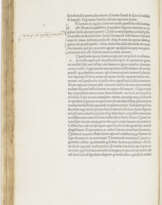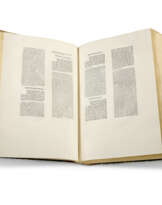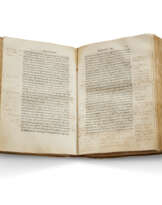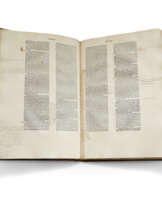ID 869486
Lot 80 | Aristotle (384 - 322 BCE)
Estimate value
£ 3 000 – 5 000
Two consecutive fragmentary bifolia from his Nicomachean Ethics, in the Latin translation of Robert Grosseteste (d. 1253), manuscript on vellum [England (Oxford?), third(?) quarter 13th century].
An early fragment, concerning friendship, of one of the foundational texts of Western philosophy.
Each c. 270 × 400mm. 29 lines in formal gothic script, the innermost two bifolia of a quire, the leaves numbered in sequence in modern pencil 1–4, with continuous text from Book 8, Lectiones 4–11, On Friendship (‘erunt amici propter delectationem […] Insuper excessus amicitie hee propter’), and with extensive notes/summaries in the lower margin of most pages in a more cursive hand (recovered from use as pastedowns in a tanned leather binding, consequently with significant darkening, stains, and wear)
Provenance:
(1) The academic nature of the text suggests that these leaves were written for study in the university environment of Oxford, where the translator had taught before becoming Bishop of Lincoln in 1235.
(2) Unidentified French owner: inscribed ‘Fin 1300’.
(3) Colker MS 30, acquired in 1963 from Maggs.
Aristotle (d. 322 BCE) is thought to have addressed this work to either his father, or more likely his young son, both called Nicomachus. It is divided into ten books, which consider how best to live, concerning moral and intellectual virtue (including generosity, gentleness, and honesty), friendship, and happiness. The present leaves are from Book 7, concerning friendship. Robert Grosseteste (d. 1253) was one of the great intellects of the Middle Ages. Late in life, after teaching at Oxford University and while Bishop of Lincoln, he learned Greek and translated a number of Aristotle’s works into Latin, including the Ethics; this translation, and revisions of it, were the primary versions for the next few centuries, and thus one of the foundation-stones of medieval (and later) philosophy.
| Artist: | Aristotle (384 BC - 322 BC) |
|---|---|
| Auction house category: | Medieval & renaissance manuscripts |
| Artist: | Aristotle (384 BC - 322 BC) |
|---|---|
| Auction house category: | Medieval & renaissance manuscripts |
| Address of auction |
CHRISTIE'S 8 King Street, St. James's SW1Y 6QT London United Kingdom | |
|---|---|---|
| Preview |
| |
| Phone | +44 (0)20 7839 9060 | |
| Buyer Premium | see on Website | |
| Conditions of purchase | Conditions of purchase |
















